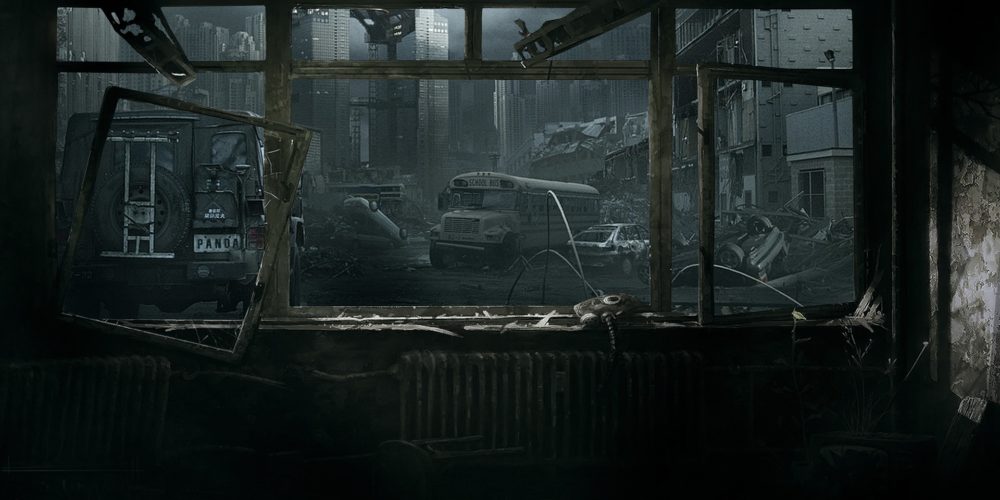Never forget: war is horror

“The sad thing is that the people who orchestrate these wars feel no personal repercussions. They have never seen combat, have never lain under a bed wondering if the sound of the screaming missile overhead is the last thing they will hear. But they happily despatch their troops to do these monstrous things on their behalf. To the families of those who meet a grisly end, they offer the meaningless comfort that their sons died in a noble cause. To the bombed-out, they offer food and medicine. It’s that easy to wipe out the stain.
When you and I stare at the TV screen and see the carnage, we feel something. We see that blood-soaked child in the arms of its screaming mother, and we want to cry with her. We see that father staring at the ruin that was his house, in which his family perished, and we want to put our arms around him. Those who devise these wars, it seems, feel nothing. They talk to us of successful raids, of collateral damage, of neutralisations and decapitations. They see no blood and hear no screams. They see only a chessboard, on which they play their games of domination.”
You might have thought I was writing about Russia’s current Ukraine misadventure there. No, those words were written in this column way back in 2003. I was referring then to George W Bush and Tony Blair, and their misguided invasion of Iraq.
Nearly two decades later, same story, different actors. Wars are usually commenced by those who face no consequences. They look only at (these days, digital) dashboards and arrays of tasks, missiles, aircraft and drones. They don’t see humans; they see icons. They might as well be playing one of those highly violent video games you worry your teenage son is being exposed to. Click, click, boom.
Except that in real wars carnage is very, very real.
Wars and invasions are very easy to begin, and very difficult to end. Killing people and destroying countries has very long-lived consequences. You might trigger intergenerational hatred and endless cycles of revenge. You might condemn your own future descendants to unending strife and conflict.
I often wonder: what if wars could only happen if those ordering them have to lead the battle in person—with their families? That was the case in many wars of yore; those initiating them had to pick up their swords and mount their horses or elephants and lead their soldiers into the battlefield, alongside their sons and brothers.
If that were true today, would anyone start a war? Would we risk our own lives and limbs as leaders, or those of our immediate family members? In self-defence, yes—but would commencing a battle or initiating an invasion be worth it to any leader if they were immediately and personally exposed to the consequences? Are any of our armchair warmongers that brave, or that committed?
Some argue that there is a “just war” doctrine—that initiating a war is justified in certain extreme cases. If a war has a just cause—imminent danger, for example, or response to grave injustice; and just intentions—the greater good, rather than narrow gain—perhaps we can argue in its favour.
In an era of relentless propaganda and manufactured fakes news, however, aggressors can justify anything to their own people. They can invent dangers and amplify differences with ease. What is just to one side is severely unjust to the other, and vice versa.
As humans on earth and citizens of our nations, there are two things we should fight for. The first is to never, ever allow our leaders to become despots who have untrammelled power. Right now, we face the prospect of collective annihilation as a species if one megalomaniac with his finger on a nuclear button is allowed to make decisions unchecked. A leader given the power of the the emperors of times past is a very dangerous thing in today’s world. He (it’s pretty much always a he) could press START on bad information; he could initiate an invasion for self-gain; he could be mentally disturbed and delusional.
That is why we must all vote for and protect strong constitutions, robust institutions, and inviolable checks and balances.
The second fight is to prevent the discourse of war from degenerating into talk of advancements and retreats, gains and losses. Those are synonyms and proxies for what really happens: gruesome horror. Families split apart and wrecked. Children orphaned; mothers given the worst news of all. Carefully built livelihoods destroyed. That’s what war is. It should never be a game; it should never be about powerful individuals and their whims and fantasies.
When we talk war, let’s be clear: we are talking of death, destruction and lifelong trauma for the victims on both sides. War is horror, and must only happen when all other options are exhausted.
(Sunday Nation, 10 April 2022)

Buy Sunny Bindra's new book
The X in CX
here »
Popular Posts
- Make this your year of being boringJanuary 4, 2026
- My books of the yearDecember 14, 2025
- Confessions of an explaining personDecember 7, 2025
- Here’s why you should become foolishNovember 30, 2025
- How to listen, really listenNovember 16, 2025















